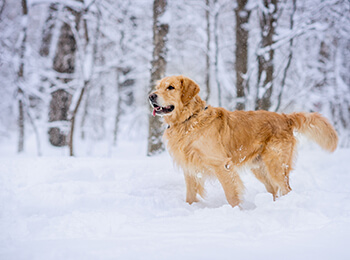Beware of winter hazards for pets
Jan 11, 2021

Winter can be a dangerous time for pets if special care isn’t taken to protect them. Here are some of the most common cold-weather hazards and ways to keep dogs and cats safe:
- Hypothermia and frostbite — All pets need adequate shelter from the elements and insulation against cold weather. Like humans, pets can suffer from hypothermia and frostbite. Provide good bedding, warm housing, and perhaps even a heated mat for outdoor pets. Your Co-op has a wide selection of all these items. Don’t use a heat lamp or other type of home heater because these could burn your pet and cause fires.
- Warm engines — Cats often seek warmth under the hood of a recently driven car and can be severely injured or killed when the car is started. Before you turn that key, knock on the hood or honk the horn to scare off any heat-seeking cats.
- Frozen water — Routinely check your pet’s water dish to make sure the water is fresh and unfrozen. Heated pet bowls, available at your Co-op, are a convenient solution for frigid temperatures. The water stays cold but doesn’t freeze.
- Snow and ice — Pets who walk on surfaces that have been “de-iced” with chemicals or salt can be sickened by licking these substances off their bodies. Thorougly wipe off your pet’s paws, legs, and belly after an outing in snow, sleet, or ice.
- Carbon monoxide — Various heat sources are used to keep both people and pets warm during the winter. Make sure these appliances are in good working order. Pets are home more than people are, so they may be affected by carbon monoxide before you notice a problem. Pets kept in the garage are also at risk if you warm up your car. Make sure there is some ventilation and air circulation in garages.
- Antifreeze — To pets, antifreeze has a sweet taste, and just a few licks can be fatal. Keep antifreeze containers away from pets and clean up spills immediately. If possible look for antifreeze that doesn’t contain ethylene glycol, which is the toxic ingredient to pets.
- Fire — Fire hazards are at their peak during the winter months. Make sure your smoke detectors have fresh batteries and include your pets when you develop a house fire evacuation plan. It’s a good idea to place a sticker on your window to alert firefighters that there are pets inside.